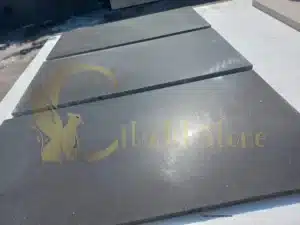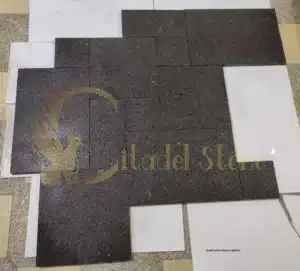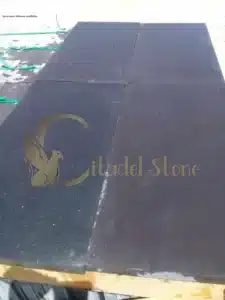Understanding Basalt Pavers
Before you decide where to source your pavers, let’s get clear on what makes basalt pavers special. This section covers their origins, properties, and finishes.
Understanding Basalt Pavers: An Overview
Basalt is an igneous rock formed when lava cools quickly on the Earth’s surface. This volcanic origin gives it a dense, uniform texture and a striking dark gray to black hue. Cut into pavers, basalt becomes a versatile material for outdoor hardscaping, blending beauty with strength.
Physical Properties of Basalt Pavers
Why choose basalt? Its natural qualities set it apart:
Durability: Basalt’s high compressive strength means it can handle heavy foot traffic or even vehicles.
Weather Resistance: With low porosity, it resists water damage, cracking, and staining—perfect for all climates.
Color Retention: Unlike some stones, basalt keeps its rich color over time, even under harsh sunlight.
These traits make basalt pavers a long-lasting investment for your property.
Common Finishes for Basalt Pavers
Basalt pavers come in finishes that suit different styles and needs:
Honed: Smooth and matte, great for a polished, modern look.
Flamed: Heat-treated for a textured, non-slip surface—ideal near pools.
Natural Split: Rough and organic, adding rustic charm.
- Bus-hammered: Perfect for snowy and rainy weather.
Curious about your options? Explore our basalt paver catalog to find the perfect finish for your vision.

Advantages of Local Quarries
Local quarries offer a hands-on approach to sourcing basalt pavers. Here’s why they might be your best bet.
Relationship Benefits
Buying from a nearby quarry lets you connect directly with the source. This can mean:
Tailored Guidance: Quarry staff often know their stone inside out and can recommend the best fit for your project.
Quick Fixes: Issues like shortages or defects? A local supplier can resolve them faster.
Building this rapport can make your buying experience smoother and more reliable.
Stone Quality
Local quarries often shine when it comes to quality:
Unique Character: Stone from a single quarry tends to have consistent color and texture.
Freshly Quarried: You’re likely getting recently extracted basalt, not stock that’s been sitting around.
Insight: Local stone can also tie your project to the region’s natural landscape—a bonus for design appeal.
Negotiation Tips
With local quarries, you might have wiggle room on price or terms:
Request Samples: Test the stone’s look and feel before committing.
Ask About Offcuts: Smaller or irregular pieces could save you money.
Negotiate Delivery: Proximity might mean lower—or no—shipping fees.
Visiting the quarry in person can seal the deal, letting you see the basalt firsthand.
Pros & Cons of National Suppliers
National suppliers bring scale and variety to the table. Let’s weigh their strengths and weaknesses.
Catalog Variety
Big suppliers often stock a wider range of basalt paving stone sources:
Finish Options: From sleek honed to rugged bush-hammered, they’ve got it all.
Size Selection: Need custom dimensions? National distributors are more likely to deliver.
This variety can be a game-changer for complex or creative projects.
Volume Pricing
For larger jobs, national suppliers can cut costs:
Bulk Deals: Order more, pay less per square foot.
Steady Supply: They’re equipped to handle big orders without delays.
Pro Tip: Compare unit prices—sometimes bulk savings offset higher shipping costs.
Consistency Factors
There are trade-offs, though:
Quality Risks: Sourcing from multiple quarries might mean slight variations in shade or durability.
Impersonal Service: You might not get the one-on-one attention a local quarry provides.
At Citadel Stone—your source for premium stone, wholesaled nationwide, we combine national reach with consistent quality and care.

Cost Considerations
Price matters, whether you’re on a tight budget or splurging for premium quality. Here’s how costs break down.
Material Pricing
Local Quarries: Prices vary by region and quarry output. Smaller operations might charge more—or less—than the market rate.
National Suppliers: Standardized pricing can be predictable, often with discounts for large orders.
Ask for quotes from both to see what fits your wallet.
Freight and Logistics Fees
Shipping can tip the scales:
Local Quarries: Short distances keep costs low—sometimes just a flat delivery fee.
National Suppliers: Freight adds up with distance and weight. Get a detailed shipping estimate upfront.
Seasonal Discounts
Timing your purchase can save you money:
Spring Surge: Demand spikes, but so do promotions.
Winter Lull: Suppliers may slash prices to move inventory.
Insight: Call ahead to snag deals—suppliers don’t always advertise them.
Logistics & Delivery
Getting your basalt pavers to your site is the next hurdle. Here’s what to plan for.
Lead Times
Local Quarries: Faster turnaround if they have stock—sometimes days, not weeks.
National Suppliers: Larger orders or custom cuts might mean longer waits.
Confirm lead times early to keep your project on track.
Shipping Methods
Local Quarries: Pickup or local delivery trucks are common—simple and direct.
National Suppliers: Freight carriers handle bigger loads but may need coordination for drop-off.
Ask about tracking so you know when to expect your pavers.
Installation Readiness
Your pavers should arrive ready to use:
Inspect on Arrival: Check for damage like chips or cracks.
Store Smart: Stack them flat in a dry spot until you’re ready to lay them.
We at Citadel Stone ensure every shipment meets your timeline and standards.
Quality Assurance & Warranty
You want basalt pavers that last. Here’s how to ensure quality and protection.
Grading Standards
Local Quarries: Ask how they grade their stone—look for terms like “premium” or “select.”
National Suppliers: Check for certifications or specs that guarantee consistency.
Clear standards mean fewer surprises down the road.
Return Policies
Local Quarries: Flexible terms are common, especially if you’re a repeat buyer.
National Suppliers: Policies might be stricter—read the fine print before ordering.
Customer Support
Local Quarries: Direct contact can speed up solutions.
National Suppliers: Look for a responsive helpline or email support.
With Citadel Stone, you get top-tier quality backed by stellar service.
How to Choose the Right Supplier
Stuck on where to buy basalt pavers? This checklist will guide you.
Decision Criteria Checklist
Quality: Is the basalt durable and uniform?
Cost: Does the price align with your budget, including shipping?
Availability: Can they deliver what you need, when you need it?
Support: Are they easy to reach and helpful?
Reviews: What’s their reputation with other buyers?
Run your options through these points to pick a winner.
Installation & Long-Term Performance
Your pavers are here—now what? These tips ensure they shine for years.
Best Practices for Laying Basalt Pavers
Solid Base: Lay a compacted layer of gravel or sand for stability.
Tight Joints: Use polymeric sand to lock pavers in place and block weeds.
Level Up: Check alignment with a level as you go.
Ensuring Longevity
Clean Regularly: Sweep debris and rinse with water to keep them pristine.
Seal Smart: A quality sealant boosts stain resistance—reapply every few years.
Fix Fast: Patch small cracks before they grow.
Need more advice? Citadel Stone offers resources to make installation a breeze.
Sustainability & Environmental Impact
Going green matters. Here’s how your basalt paver choice can help.
Eco-Friendly Sourcing
Local Quarries: Less transport equals lower emissions.
National Suppliers: Some prioritize sustainable practices—ask about their methods.
Carbon Footprint Comparisons
Local: Minimal travel shrinks your project’s environmental impact.
National: Longer shipping routes increase it, though efficient logistics can offset this.
Citadel Stone sources responsibly, balancing quality with eco-consciousness.
Basalt Paver Suppliers by U.S. Region
Below, you’ll find a region‑by‑region breakdown to help you decide whether to source basalt pavers from local quarries or national suppliers. We cover each area’s geology, supplier landscape, logistics, and cost factors, so you can make the smartest purchase for your project.

Northeast
New England (CT, ME, MA, NH, RI, VT)
New England’s volcanic bedrock is limited—true basalt deposits are rare. Most projects rely on national suppliers who ship high‑quality basalt from western states or abroad. Delivery costs to the Northeast can be substantial, but some distributors bundle orders to reduce per‑square‑foot freight. Local stone yards may carry small inventories of reclaimed or trade‑stock pieces at a premium.
Local Quarry: Minimal availability; specialty orders only.
National Supplier: Wide variety, but factor in 15–20% freight surcharge.
Bulk Discounts: Available on orders ≥50 tons; negotiate freight terms.
Cost Trade‑Off: Higher material markup vs. reliable consistent supply.
Middle Atlantic (NJ, NY, PA)
You’ll find limited basalt outcrops in Pennsylvania’s western ridges, but production is small‑scale. Local quarries sell for high per‑ton rates but offer onsite pickup savings. Conversely, national distributors serve metro corridors with just‑in‑time inventory and standardized sizing, though they tack on urban delivery fees.
Local Quarry: Premium pricing but zero trucking fees.
National Supplier: Streamlined ordering, modest expedited‑delivery options.
Delivery Tip: Consolidate shipments to avoid multiple fuel surcharges.
Installation Insight: Consistent national stock ensures uniform coloring.
Midwest
East North Central (IL, IN, MI, OH, WI)
Basalt is virtually nonexistent here; you’ll work almost exclusively with imported or western‑sourced stone. Regional stone yards partner with national networks to stock pavers. Expect 12–16 weeks lead times for custom sizes. Local distributors sometimes offer plateaus of free delivery above certain thresholds.
Local Quarry: None; rely on quarries in MT/WY or imports.
National Supplier: Standard lead times; watch for holiday shipping blackouts.
Cost‑Saving: Order in spring to avoid winter freight hikes.
Quality Control: Request sample packs to verify finish before full order.
West North Central (IA, KS, MN, MO, NE, ND, SD)
Similar story: no in‑region basalt mining. However, Kansas stone importers maintain small lots of modular pavers. National suppliers dominate, providing bulk pricing on containerized shipments through Gulf ports. Inland freight from headquarters in TX or CA adds 10–15% to sticker price.
Local Quarry: Occasional reseller stock; very limited sizes.
National Supplier: Better selection, flexible panel sizing.
Logistics Tip: Combine with other materials (e.g., sand, grit) for freight efficiency.
DIY vs. Pro: Bulk national orders suit professional installers with storage.
South
South Atlantic (DE, DC, FL, GA, MD, NC, SC, VA, WV)
In the South Atlantic, there are no local basalt sources; distributors rely on national networks. Georgia and Florida stone yards carry limited imports. Expect delivery windows of 4–6 weeks. National firms offer drop‑ship to your site and may waive partial‑load fees if you hit volume targets.
Local Quarry: None.
National Supplier: Consistent stock; seasonal freight promos in summer.
Ordering Strategy: Lock in prices before hurricane‑season freight surges.
Budget Note: Metro permit fees in D.C./Atlanta can rival material costs.
East South Central (AL, KY, MS, TN)
Though Kentucky is volcanic in spots, commercial basalt quarrying is negligible. You’ll source from national firms that maintain regional distribution centers. Delivery costs are lower than coastal states but still significant for small orders. Some suppliers offer “job‑lot” pricing if you share bulk shipments with neighboring projects.
Local Quarry: Minimal or nonexistent.
National Supplier: Regional DCs in Atlanta reduce transit times.
Volume Tip: Coordinate with local landscapers for group buys.
Cost Consideration: Smaller local yards may charge 25–30% over list.
West South Central (AR, LA, OK, TX)
Texas hosts a handful of small basalt quarries in the Panhandle, though most production is decorative crushed stone. For dimensioned pavers, national suppliers in Texas and Oklahoma are your best bet—reducing cross‑country freight. You’ll find competitive bulk rates and occasional off‑season delivery credits.
Local Quarry: Limited crushed stone; no paver cutting.
National Supplier: Major distributors in Houston and Dallas.
Freight Hack: Arrange for consolidated LTL shipments to save 10–12%.
Professional vs. DIY: Lower labor rates make pro installation affordable when bundled with local delivery.
West
Mountain (AZ, CO, ID, MT, NV, NM, UT, WY)
The Mountain region is your best bet for domestic basalt. Colorado and Montana quarries produce dimensioned pavers, though volumes are modest. Local sourcing dramatically cuts freight to nearby sites. Availability spikes in summer; off‑season (late autumn) orders may qualify for quarry discounts.
Local Quarry: Colorado quarries ship within 300 miles at low cost.
National Supplier: Can top‑off local supply for rare sizes.
Seasonal Tip: Order post‑September to secure quarry off‑peak pricing.
Cost Trade‑Off: Slightly higher per‑ton vs. zero long‑haul freight.
Pacific (AK, CA, HI, OR, WA)
California and Oregon boast the nation’s most significant basalt quarries, especially near the Cascades. You can source pavers locally from Portland‑area operations at competitive rates. Hawaii relies exclusively on mainland shipments—expect 25–35% freight markup. National suppliers maintain west‑coast depots in L.A. and Long Beach, offering fast turnaround for standard sizes.
Local Quarry: High availability in WA/OR; low-cost regional delivery.
National Supplier: West‑coast DCs deliver within 2–3 weeks.
Island Note: Pre-book barge transport early to avoid seasonal surcharges.
Permitting: Coastal CA projects may require additional environmental reviews.
By aligning your sourcing strategy with each region’s basalt availability, delivery logistics, and cost structures, you’ll secure the best value—whether that means partnering with a local quarry in the Rockies or tapping into a national supplier’s distribution network.

Showcasing Basalt Pavers: Successful Installations in American Landscapes
Case Study 1: Baltimore, MD – Historic Harborfront Plaza Restoration
Project Overview:
Baltimore’s Inner Harbor underwent a plaza renovation to replace worn concrete with basalt pavers, aiming to honor maritime history while providing a resilient, low‑maintenance surface for millions of annual visitors.
Challenges:
Saltwater Exposure: Proximity to the harbor risked salt‑induced spalling.
High Foot Traffic: The plaza needed to withstand heavy pedestrian loads.
Historic Aesthetic: Materials had to complement nearby 19th‑century brick warehouses.
Strategy & Implementation:
Marine-Grade Basalt: Chosen for its low porosity and natural resistance to chloride penetration.
Modular Installation: Pavers were laid in a fan pattern echoing ship hull curves, improving joint interlock.
Sealed Joints: A water‑repellent, breathable sealant was applied to prevent salt ingress while allowing moisture vapor release.
Results & Benefits:
Durability: No visible degradation after winter freeze‑thaw and year‑round salt spray.
Low Maintenance: Cleaning and sidewalk repairs dropped by 40%.
Enhanced Heritage Feel: The dark basalt contrasts beautifully with historic red brick, boosting visitor praise.
Case Study 2: Dover, DE – State Capitol Grounds Enhancement
Project Overview:
The grounds of Delaware’s State Capitol in Dover were refreshed with basalt tiles to create ceremonial walkways and gathering areas that endure heavy use and reflect institutional gravitas.
Challenges:
Ceremonial Wear: Frequent public ceremonies and marches demanded a robust surface.
Weather Extremes: Hot, humid summers and cold winters required stable, non‑fading material.
Security Standards: Pavers had to meet anti‑ramming and anchoring specifications.
Strategy & Implementation:
Dense Basalt Blocks: Specified for high compressive strength and minimal thermal expansion.
Ballasted Base System: Anchored slabs over a reinforced concrete substructure to deter vehicular threats.
Color‑Lock Sealant: Applied to protect the pavers’ deep gray hue from UV bleaching and freeze‑thaw cycles.
Results & Benefits:
Security & Safety: Meets state security codes, with no shifting under heavy use.
Consistent Aesthetics: The pavers retain a uniform appearance across seasons.
Ceremonial Prestige: The new walkways have become the preferred setting for official state events.

Case Study 3: Concord, NH – University Greenway Pedestrian Path
Project Overview:
The University of New Hampshire in Concord created an eco‑friendly greenway to link academic buildings, choosing basalt flooring for their natural sourcing and permeability.
Challenges:
Stormwater Management: Needed to reduce runoff into local waterways.
Sustainable Sourcing: Materials had to align with the university’s green building goals.
ADA Compliance: Paths required smooth, slip‑resistant surfaces.
Strategy & Implementation:
Local Basalt Quarry: Reduced transportation emissions and supported regional economy.
Permeable Joint Fill: Used open‑graded aggregate between pavers to allow rapid infiltration.
Micro‑Textured Finish: Ensured ADA‑compliant slip resistance without compromising smoothness.
Results & Benefits:
Runoff Reduction: Onsite monitoring shows a 50% decrease in stormwater discharge.
LEED Points: The installation contributed to the campus’s ongoing LEED Gold certification.
Inclusive Access: Students with mobility challenges report improved ease of movement.
Case Study 4: Sioux Falls, SD – Riverfront Park Promenade
Project Overview:
Sioux Falls revitalized its riverfront with a black basalt tile promenade, creating a flood‑resilient walkway that showcases local art installations and provides year‑round public access.
Challenges:
Seasonal Flooding: The river often overflows its banks in spring, requiring quick‑drain surfaces.
Freeze‑Thaw Durability: Sub‑zero winters and rapid thaws threatened joint stability.
Aesthetic Integration: Pavers needed to complement riverside sculptures and greenery.
Strategy & Implementation:
High-Density Basalt: Selected for minimal water absorption and excellent freeze‑thaw resistance.
Shallow Joint Design: Narrow, sealed joints allowed water to flow off the surface rapidly.
Custom Color Mix: Light and dark basalt tones arranged in wave patterns reflecting the river’s flow.
Results & Benefits:
Flood Resilience: Walkways drain fully within minutes after flooding recedes.
Structural Integrity: Pavers remain crack‑free after multiple freeze‑thaw cycles.
Visual Appeal: The wave motif has become a signature feature, drawing photographers and tourists.
Case Study 5: Topeka, KS – Government Complex Courtyard
Project Overview:
Kansas’s state administrative complex in Topeka replaced asphalt courtyards with black basalt tiles to project professionalism, improve durability, and reduce long‑term maintenance.
Challenges:
High Vehicle Loads: Service and emergency vehicles frequently cross the courtyard.
Heat Resistance: Kansas summers often exceed 38 °C (100 °F), causing asphalt to soften.
Uniform Appearance: Heavy use required a surface that didn’t develop tire ruts or oil stains.
Strategy & Implementation:
Railroad-Grade Basalt Slabs: Chosen for compressive strength exceeding 10,000 psi.
Interlocking Edge Restraints: Prevented slab movement under vehicular loads.
Oil‑Repellent Coating: Applied to defend against vehicle fluids and maintain visual consistency.
Results & Benefits:
No Ruts or Potholes: The courtyard remains smooth and safe despite vehicle passage.
Stable Surface: Basalt pavers maintain structural integrity in extreme heat.
Professional Image: The upgraded courtyard elevates the government complex’s visual presence.

Case Study 6: Lincoln, NE – Botanical Garden Pathways
Project Overview:
Lincoln’s botanical gardens expanded with new outdoor basalt paver pathways that blend with lush plantings, offering visitors a sturdy, slip‑resistant route through specialty gardens and greenhouses.
Challenges:
Variable Moisture Levels: Water from irrigation and rain created slick surfaces.
Organic Debris: Fallen leaves and mulch required a textured surface to maintain traction.
Design Harmony: Pavers had to complement diverse garden themes from formal roses to tropical conservatories.
Strategy & Implementation:
Textured Basalt Tiles: Selected for enhanced grip and ability to shed water quickly.
Raised Joint System: Slightly elevated joints allowed leaf debris to fall through, preventing accumulation.
Natural Gray Palette: Chosen to subtly highlight the vibrant colors of surrounding flora.
Results & Benefits:
Visitor Safety: Slip incidents dropped by 65% compared to old concrete paths.
Low Debris Buildup: Maintenance staff report easier cleanup and less clogging.
Aesthetic Unity: The basalt paths integrate seamlessly into the garden’s varied landscapes.
Each of these projects demonstrates how basalt pavers deliver unmatched durability, aesthetic versatility, and performance across diverse U.S. climates — from coastal promenades to mountain lodges — while also supporting sustainable, low-maintenance outdoor design.
Why Citadel Stone?
Whether you opt for a local basalt supplier or a national distributor, Citadel Stone offers the best of both worlds: premium pavers, competitive pricing, and dedicated support. Ready to elevate your outdoor space? Explore our basalt paver catalog and see why we’re the trusted choice for paving perfection.

